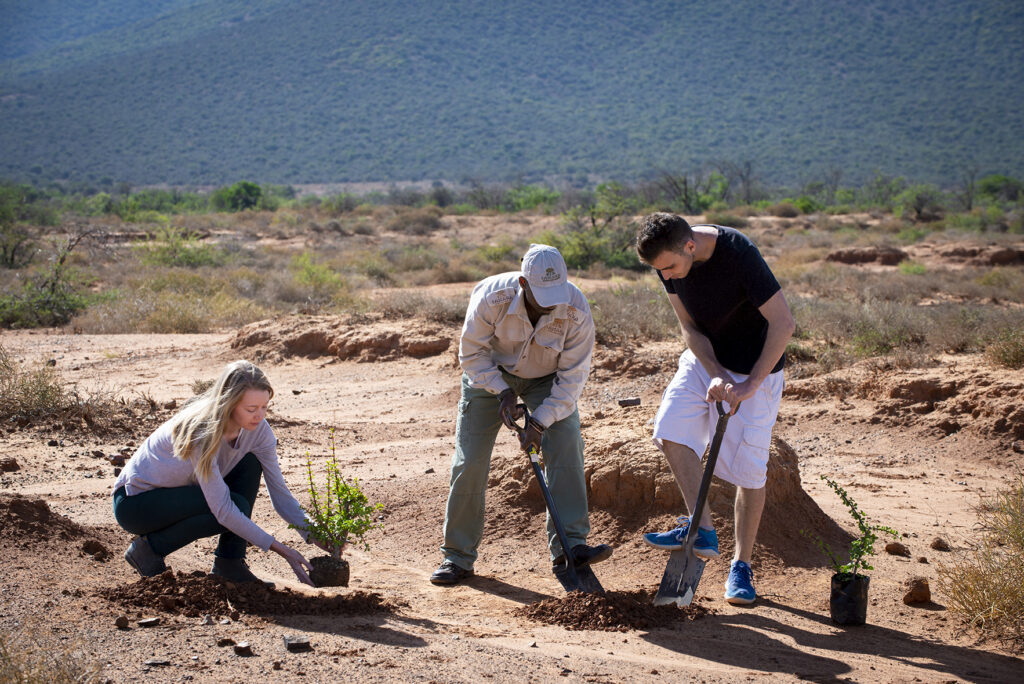Founded in 2010, the Tracker Academy was established to help disadvantaged individuals from underprivileged rural areas. By teaching them wildlife tracking and how to apply this to animal monitoring, ecotourism and wildlife protection, the Tracker Academy is preserving traditional skills and setting up systems which will protect the wildlife and land for years to come.
In March 2024, we will host an exclusive journey of up to 16 guests to discover the Great Karoo. Read more about the journey here, and apply to join the journey here.
“We are born to track. We keep track of time, weather, family, finances. We sometimes lose track of ourselves and of our relationships, and then we get back on track… The art of tracking is also an art of living.”
-Ian McCallum, poet, psychiatrist and trainer at the Tracker Academy
The Tracker Academy was set up and hosted, in part, on the Samara Private Game Reserve where Journeys With Purpose is hosting an immersive conservation journey from 18th-23rd March 2023. We are fortunate enough to be working with members of this impressive organisation for a walk and game drive followed by a talk and the opportunity to hear their stories.
Who Are The People of the Tracker Academy?
Most graduates from the Academy began feeling uncertain about their future. The curriculum allows for both learning and instilling a culture of conservation, which they can go on to spread throughout their communities.
Starting with just eight students in one campus, the Academy now accommodates 24 trainees across three sites. Even more impressive, is that of 150 graduates so far, 94% have gone on to find employment in anti-poaching, wildlife monitoring and ecotourism. Many of the graduates receive their job offers before they have even completed their courses.
Wildlife tracking is an ancient art form often misconstrued as a mystical skill only possessed by a lucky few. However, this misunderstanding of a skill which evolved to aid human survival has slowed the formal training and use of tracking as a valuable conservation management tool.
The chief trainer of the academy is Karel ‘Pokkie’ Benadie who was born in the Karoo National Park and is one of only six master trackers in South Africa. We caught up with his wife and fellow trainer, Janetta, who has been with the Academy since it started in 2010 to ask what it’s like to be part of the team there:
Interview With Janetta Bock: Notes From The Tracker Academy
What has been the most rewarding thing about being part of the Tracker Academy?
The most rewarding part of my role at the Tracker Academy is getting to witness the young people who come to us and find a purpose in life. Sometimes this happens during the course, and sometimes after completion of the course.
What has been the most interesting part of your work at Samara in 2022 so far?
Aside from the human element I have mentioned above, one of the most interesting parts of my work so far this year was to get to see leopard tracks on the property.
How do you see the future for the Tracker Academy?
This project has been very successful over the years. Graduates have found successful employment in anti-poaching, ecotourism and animal monitoring and so have made a massive contribution to the industry. We initially started with two training campuses but have opened a third over the last few years. I would like to see that we have training sites in each province.
What is it like to work in such an incredible setting of The Great Karoo?
Being surrounded by the animals, plants, mountains and the endless plains is priceless. I feel honoured to say the least.
What will the Tracker Academy guides be able to teach guests visiting Samara with Journeys With Purpose in March 2023?
Students will be able to learn and demonstrate skills in track and sign identification as well as the ability to follow a wild animal on its spoor.

Tracking In The Great Karoo
Samara’s team of trackers are an integral part of the incredible experience we have curated with the hosts. Those guests who are particularly interested in the Tracker Academy’s work are invited to join one of their morning tracking sessions during which they will gain first hand insight into analysing signs of recent wildlife activity, through footprints or broken branches, and how to follow these signs in pursuit of the animal. From jackals to springboks, from leopards to rhinos, the Karoo contains herds of wildlife. It has the greatest number of tortoise species of any park in the world.
The karoo offers vast plains, majestic mountains and picturesque towns steeped in history, flora and fauna. As part of our journey to Samara Reserve in March, we will spend time with the team behind the Tracker Academy, to learn about this deep-rooted tradition and be involved in an experience which reconnects us with the natural world.
Our journey will host an exclusive group of up to 16 guests between 10th – 16th March 2024. Apply to join here.
More to Explore
The Return of the Cheetah: Rewilding the Great Karoo
Spekboom: The carbon sequestering plant in Africa’s Great Karoo